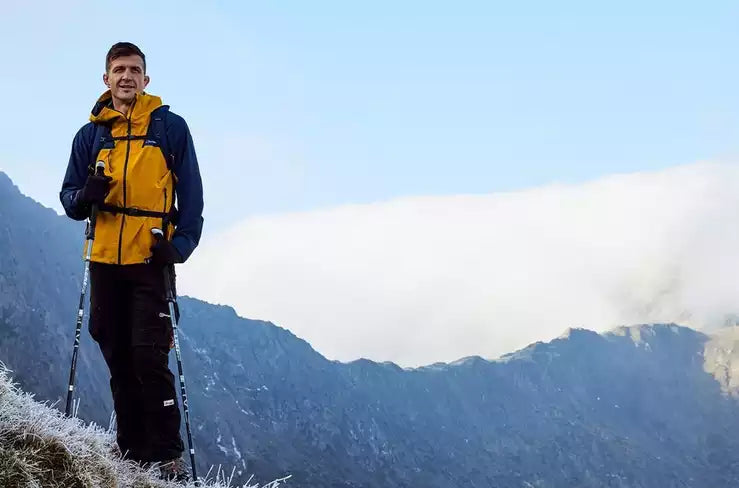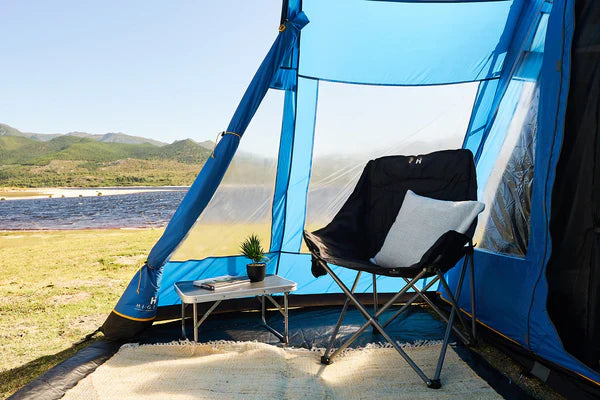Bagging the Wainwright's | A Record-Breaking Pursuit
James Forrest recently set an incredible new record time for a self-supported continuous hike of Alfred Wainwright’s 214 Lake District peaks. The 37-year-old, a journalist, adventurer and outdoor ambassador from Cockermouth, Cumbria, walked 525km (328 miles) to complete the peak-bagging feat in 14 days and 11 hours. He ascended 36,000m - the equivalent height gain of four times Mount Everest – and wild camped for 14 consecutive nights during the adventure.
Hiking alone with no support crew or pre-arranged help, James carried all his kit and camping equipment in a large rucksack. He occasionally re-supplied along the route with food that he had earlier stashed in secret locations along the route. Here James speaks to Blacks about his expedition – and, in particular, how he adopted a fast and light approach, using ultralight kit and keeping his backpack weight to a bare minimum.
Why did you decide to do all the Wainwrights in one push?
Lockdown put paid to all of my 2020 adventure plans and the year quickly morphed into something far lazier and more limited than I’d envisioned. I felt hemmed in and frustrated, struck down by wanderlust and itchy feet. So I decided to plan another grand expedition for post-lockdown. A non-stop, single round of all 214 Wainwright fells struck me as the ultimate Lake District adventure. But I’m no runner, so I decided to hike the route and take it on self-supported. I hoped my adventure would strike a tricky balance: simultaneously providing an arduous physical challenge that pushed my boundaries and tested my limits, but also serving up the spiritual joys - freedom, escapism, nature, tranquillity – of the mountains.
Your adventure was self-supported – what does that mean?
In simple terms, it just meant that I walked solo and unaided, didn’t have a support crew and had no pre-arranged help or assistance. I made a conscious effort to ensure my adventure was authentically self-supported. My aim was to be as self-reliant and self-sufficient as possible, and to genuinely survive alone in the mountains. I believe I achieved this aim by: wild camping or bivvying every night; cooking my own food every night (I didn't use any pubs, restaurants or cafes); and re-supplying exclusively via stash boxes I’d previously hidden across the Lake District, rather than going to shops or supermarkets.
It sounds like a hardcore expedition - what distances did you cover?
I walked 525km in total, ascending 36,000m. This averaged out at about 35km per day, bagging 14 Wainwrights and climbing 2,400m daily for 15 days in a row. However, I had a slightly slow start, and really picked up the pace towards the end. The most Wainwrights I ticked off in a day was 21 (this was on the final day of my challenge), and my longest day was about 51km (again my final day). In fact, on the last two days of my expedition, I was so desperate to get home I walked 106km with 6,750m of ascent. I walked for 12 hours a day on average, sometimes longer.
Did you enjoy the adventure and how did it feel to finish?
I am ecstatic with the time I set and so relieved that I made it to summit number 214. The atrocious weather transformed my journey into a rather gruelling and traumatic experience at times – I’ve never felt so utterly miserable and unhappy on a mountain before. I thought the torrential rain and strong winds would never stop. But I’m so happy that I found the strength and resilience to keep going and make it to the finish line – it was really emotional arriving into Keswick, cheered on by friends and family. That moment will stay with me forever.
It was the challenge of a lifetime. I love the Lake District and – if I can somehow forget the thrashings I took from the weather gods – I hope the enduring memories of my expedition will be the times when the sun did shine and I relished the peace, beauty and escapism of Lakeland. The Lake District is a special place and we should all respect and look after it.







